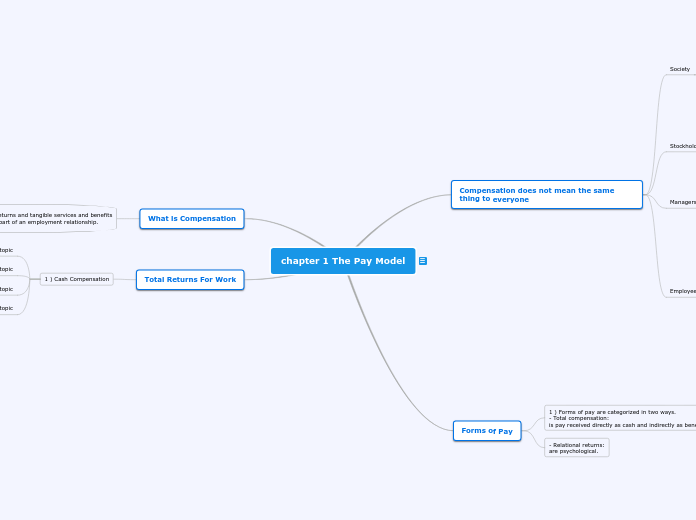chapter 1 The Pay Model
Compensation does not mean the same thing to everyone
Society
1 ) Some people see pay as a measure of justice.
- Laws and regulations aim to eliminate the gap between male/female earnings differentials.
- Benefits may also be seen as a reflection of equality or justice in society.
2 ) Job losses (or gains) in a country is partly a function of labor costs (and productivity).
Stockholders
1 ) Some stockholders say using stock to pay employees creates a sense of ownership.
- Others argue it dilutes stockholder wealth
2 ) Stockholders have a particular interest in executive pay.
L- inking executive pay to company performance increases stockholders' returns.
Managers
1 ) Compensation influences manager’s success in two ways.
- First, it is a major expense that must be managed.
- Second, it is a major determinant of employee attitudes and behaviors.
Employees
1 ) Pay is usually a major source of financial security.
2 ) Employees may see compensation as:
- a return in an exchange,
- an entitlement for being an employee of the company,
- an incentive to take/stay in a job and invest in performing well, or
- as a reward for having done so.
3 ) Pay can influence employee motivation and behavior in two ways:
- The incentive effect is the degree to which pay influences individual and aggregate motivation.
- The sorting effect is the effect that pay can have on the composition of the workforce.
- How an organization pays can result in sorting effects.
Forms of Pay
1 ) Forms of pay are categorized in two ways.
- Total compensation:
is pay received directly as cash and indirectly as benefits.
- Relational returns:
are psychological.
What is Compensation
All forms of financial returns and tangible services and benefits employees receive as part of an employment relationship.
Total Returns For Work
1 ) Cash Compensation
Subtopic
Subtopic
Subtopic
Subtopic
